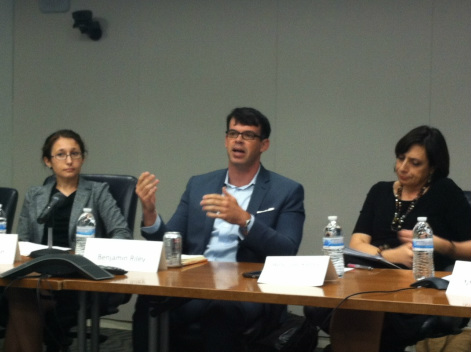 Photo courtesy of National Council on Teacher Quality
Photo courtesy of National Council on Teacher Quality
 Photo courtesy of National Council on Teacher Quality Photo courtesy of National Council on Teacher Quality This month, the education reform nonprofit TNTP released Perspectives of Irreplaceable Teachers, a follow-up report to 2012’s groundbreaking The Irreplaceables, which highlighted the crisis school districts face in retaining highly-effective teachers. In Perspectives, TNTP researchers spoke with 117 of the most elite, skilled American educators about their thoughts on the teaching profession. I’d like to zero in on one of the main findings: These highly-effective teachers attribute little of their success to formal preparation or professional development programs.
0 Comments
 Photo courtesy of MEGA Brands America. Photo courtesy of MEGA Brands America. Though I know you may be positively shocked by this revelation, it seems that thanks to the rise of word processing, cursive writing is largely dying out. As the New York Times has reported, where schools used to teach script writing from third grade to as late as eighth grade, districts have reduced the number of grades in which the writing style is taught, sometimes limiting it just to the third grade. Perhaps the clearest sign of the potential death of cursive is this infographic from MEGA Brands America, a pencil-making company, whose haste to remind the American public of it’s own support for script betrays an industry running scared. It’s a sad state of affairs for handwriting enthusiasts everywhere, to be sure. I’ll give you a moment to compose yourself. New York City took a big, important step toward teacher preparation reform this week. The city’s department of education, in a first-ever move nationwide, released scorecards on the 12 teacher education programs that supply the most educators to the city. They judge the quality of the programs based on new teachers’ performance and success (or lack thereof) in the classroom.
The scorecards highlight colleges that are graduating teachers who are highly effective, specialized, and more likely to stick with the profession for more than three years. It shines a desperately needed light on teacher preparation, one that panelists pushed for during a YEP-DC event panel this month. The event, called “Teaching the Teachers,” invited experts, researchers, and practitioners to weigh in on the all-important goal of strengthening teacher training across the nation. For years, teachers have been far more likely to support depth of study rather than laps around the track of increasingly long content curricula. In a post last month, I called for a new emphasis on skill-building over the rote memorization that has dominated our educational system for decades. So what has stood in our way? Mostly, a standardized testing regime that requires students to know instead of know how. Now, we are on the verge of real change as both the Common Core State Standards (CCSS) and the GED (used by alternative schools like mine) are revamping the testing landscape to focus more on skill and depth of study. But will everyone get on board? And even more importantly: Will everyone understand what this shift means for classroom instruction?
I’ve written before (a bit grumpily) about all of the hype around MOOCs. I tend to think that the narrative of an inevitable march toward MOOC disruption is overblown. But a few recent developments (and an unrelenting amount of punditry on the topic) have been a bit frustrating to me. To my mind, there are good reasons to criticize the educational value that MOOCs provide and to doubt the prospect that they might totally upend the higher education world, but far too often those good reasons are ignored for a much less rigorous focus on why MOOCs are bad for college professors.
|
aboutYEP-DC is a nonpartisan group of education professionals who work in research, policy, and practice – and even outside of education. The views expressed here are only those of the attributed author, not YEP-DC. This blog aims to provide a forum for our group’s varied opinions. It also serves as an opportunity for many more professionals in DC and beyond to participate in the ongoing education conversation. We hope you chime in, but we ask that you do so in a considerate, respectful manner. We reserve the right to modify or delete any content or comments. For any more information or for an opportunity to blog, contact us via one of the methods below. BloggersMONICA GRAY is co-founder & president of DreamWakers, an edtech nonprofit. She writes on education innovation and poverty. Archives
May 2017
Categories
All
|


 RSS Feed
RSS Feed